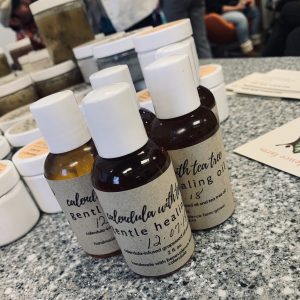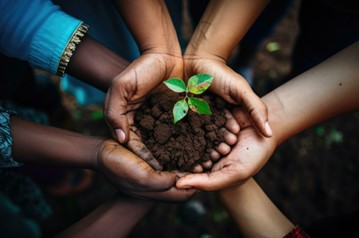On February 18, 2019, four residents from Benevolence Farm, a re-entry program for formerly incarcerated women, visited the Social Innovation Entrepreneurship Lab (SIEL) to share their personal stories about their time and work at Benevolence Farm. They shared about how they use social entrepreneurship to support their mission by selling shares in their farm and their handmade body care products. “Benevolence Farm is a program that seeks to cultivate leadership, sustain livelihoods, and reap structural change with individuals impacted by the criminal justice system in North Carolina.”
Matt Ballard, Farm Manager and UNC School of Social Work alumnus, shared an overview of the program. It is located in South Alamance County, Graham, NC. After some research, Matt and his colleagues found that the average time someone needs help from leaving prison is three years, which is much longer than most other re-entry programs are able to provide support, and so the staff thought about how they could design a farm-based program to support recently incarcerated women towards successful re-entry.
Benevolence Farm is a transitional housing program. Women live and work on the farm, which serves as an employment readiness program. Employment and housing provided by the farm comes with case management services and connections to other resources like mental health and substance use disorder treatment, financial literacy training, and parenting classes. Women who are leaving state prison are eligible regardless of the prison time that they served. Women apply while they’re still incarcerated with the help of social workers, and then have an interview for the program. When accepted into Benevolence Farm and discharged from the prison, they are greeted warmly by Benevolence staff and residents with a “Welcome Home” meal, clothes, a bed, and the start of a new life.
The employment phase of the program starts two weeks after arrival to allow space for getting used to the new environment and the practice of decision making, from deciding what to eat for breakfast to deciding what activities they’d like to be involved in.
Residents shared powerful messages about what Benevolence Farm means to them:
- “It means a lot to me because it saved my life. If it weren’t for Benevolence, I’d be incarcerated again”
- “I love seeing the plants grow and knowing I’ve grown too. I don’t know where I’d be without Benevolence Farm”
- “I’d still be in prison if not for Benevolence”
- “Benevolence is where I live, where I feel safe, it’s what I do. Benevolence is my life.”
- “This program has changed my life. I was on drugs about 13 years. After three years of prison I had no clue where I was going to go. I have no clue where I’d be today if not for Benevolence.”
- “In the future, I will become a peer support specialist. It’s [Benevolence] changed my life and I want to give back and help the way they’ve helped me.”
- “When I feel like giving up, they remind me not to. It’s a place of second chances.”
- “We are like the flowers and plants and vegetables that we plant. We’re always growing.”
- “They helped me find myself after feeling like I’ve been lost for so long.”
 In addition to their day to day work and chores, social innovation has sprouted. The women at Benevolence Farm grow and harvest plants that are used for the creation of all-natural body care products including face masks, oils, lotions, and muscle cream among others. The residents research and brainstorm ideas, and test products they later sell. These products they sell are not just another body care product. They are connected to a greater meaning and a story of transformation. The products are connected to a social mission of supporting formerly incarcerated women towards sustainably changed lives.
In addition to their day to day work and chores, social innovation has sprouted. The women at Benevolence Farm grow and harvest plants that are used for the creation of all-natural body care products including face masks, oils, lotions, and muscle cream among others. The residents research and brainstorm ideas, and test products they later sell. These products they sell are not just another body care product. They are connected to a greater meaning and a story of transformation. The products are connected to a social mission of supporting formerly incarcerated women towards sustainably changed lives.
Products can be purchased at: https://benevolence-farm-body-care.myshopify.com/?fbclid=IwAR0eNyYhsChIokVSr1avr4wOHLzY1ms7SU8Zejwkvo0rmOixC1LAGALwAs4
Community Supported Agriculture Membership can be purchased at: http://benevolencefarm.org/get-involved/csa/
